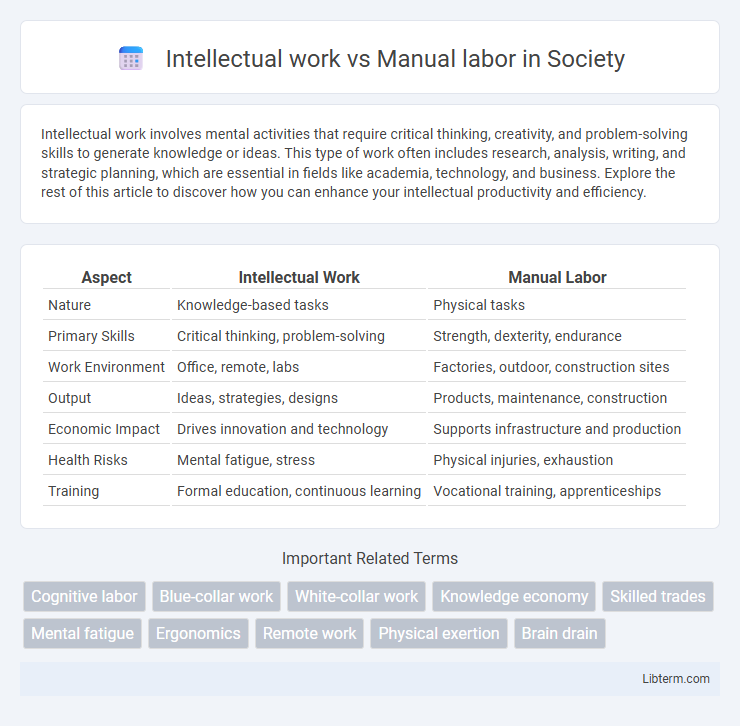Intellectual work involves mental activities that require critical thinking, creativity, and problem-solving skills to generate knowledge or ideas. This type of work often includes research, analysis, writing, and strategic planning, which are essential in fields like academia, technology, and business. Explore the rest of this article to discover how you can enhance your intellectual productivity and efficiency.
Table of Comparison
| Aspect | Intellectual Work | Manual Labor |
|---|---|---|
| Nature | Knowledge-based tasks | Physical tasks |
| Primary Skills | Critical thinking, problem-solving | Strength, dexterity, endurance |
| Work Environment | Office, remote, labs | Factories, outdoor, construction sites |
| Output | Ideas, strategies, designs | Products, maintenance, construction |
| Economic Impact | Drives innovation and technology | Supports infrastructure and production |
| Health Risks | Mental fatigue, stress | Physical injuries, exhaustion |
| Training | Formal education, continuous learning | Vocational training, apprenticeships |
Defining Intellectual Work and Manual Labor
Intellectual work involves mental processes such as analysis, problem-solving, and creativity, typically requiring cognitive skills, knowledge, and expertise in fields like research, education, and technology. Manual labor refers to physical tasks involving bodily effort, often associated with industries like construction, agriculture, and manufacturing, emphasizing strength, endurance, and practical skill. Defining these terms highlights the distinction between cognitive tasks performed primarily by the brain versus physical tasks executed by the body.
Historical Evolution of Intellectual and Manual Labor
The historical evolution of intellectual and manual labor reflects the shift from agrarian societies to industrial and information-based economies. During the Industrial Revolution, manual labor dominated production processes, while the rise of modern economies has increasingly valued intellectual work focused on innovation, technology, and knowledge management. This transition highlights the growing importance of education and cognitive skills in driving economic growth and societal development.
Key Differences Between Intellectual and Manual Labor
Intellectual work primarily involves cognitive processes such as analysis, decision-making, and problem-solving, whereas manual labor relies on physical effort and skilled hands-on tasks. Intellectual labor often requires higher education and specialized knowledge, while manual labor emphasizes physical strength, dexterity, and endurance. Productivity in intellectual work is measured by innovation and creativity, contrasting with manual labor's output based on tangible goods and physical task completion.
Societal Perceptions of Different Types of Work
Societal perceptions often elevate intellectual work as a marker of prestige, associating it with higher education, cognitive skills, and economic status, while manual labor is frequently viewed as less valuable despite its essential role in industries such as construction, manufacturing, and agriculture. This dichotomy impacts income disparity, social mobility, and worker dignity, influencing policy decisions and cultural attitudes towards vocational training and professional careers. Shifting these perceptions requires recognizing the complexity and skill inherent in all types of work, fostering respect for labor diversity and promoting equitable social recognition.
Educational Pathways and Skill Development
Intellectual work often requires extensive educational pathways, including advanced degrees and continuous skill development in areas such as critical thinking, problem-solving, and specialized knowledge acquisition. Manual labor typically emphasizes vocational training, apprenticeships, and hands-on skill mastery that prioritize physical expertise and technical proficiency. Both pathways involve targeted learning processes, but intellectual work leans more on theoretical education while manual labor focuses on practical, experiential skills.
Economic Value and Compensation Comparison
Intellectual work often generates higher economic value due to its role in innovation, strategic decision-making, and knowledge creation, which drive productivity and competitive advantage in knowledge-based economies. Compensation for intellectual labor typically exceeds that of manual labor, reflecting the specialized skills, education required, and the scalability of intellectual outputs. Manual labor, while essential to operational functions and tangible goods production, generally receives lower wages due to the limited scalability and substitution by automation technologies.
Physical and Mental Health Impacts
Intellectual work often leads to cognitive strain, mental fatigue, and stress-related disorders due to prolonged concentration and screen exposure, while manual labor primarily impacts physical health through musculoskeletal injuries and chronic pain from repetitive tasks. Sedentary intellectual tasks increase risks of cardiovascular diseases and vision problems, whereas manual labor can enhance physical fitness but also contributes to early onset arthritis and occupational hazards. Balancing both work types with ergonomic measures and regular physical activity is crucial to mitigate adverse health effects and promote overall well-being.
The Role of Technology in Transforming Work
Technology has revolutionized both intellectual work and manual labor by automating repetitive tasks and enhancing productivity through advanced tools like artificial intelligence and robotics. Intellectual work benefits from software that facilitates data analysis, communication, and problem-solving, while manual labor increasingly relies on mechanization and automation to improve efficiency and reduce physical strain. This technological transformation reshapes job roles, requiring workers to adapt to new skill sets and fostering a more integrated approach between cognitive and physical tasks.
Challenges and Opportunities in Each Sector
Intellectual work faces challenges such as cognitive overload and the need for continuous skill updating due to rapid technological advancements, while offering opportunities for innovation, creativity, and knowledge-driven economic growth. Manual labor encounters physical strain and job insecurity from automation trends but presents opportunities in specialized craftsmanship, infrastructure development, and roles requiring human dexterity. Both sectors require adaptive workforce strategies to balance evolving demands and leverage their unique strengths in the modern economy.
Bridging the Gap: Integrating Intellectual and Manual Skills
Bridging the gap between intellectual work and manual labor enhances productivity by combining cognitive problem-solving with hands-on expertise, fostering innovative solutions. Integrating digital tools in manual tasks allows workers to leverage data analysis and automation, creating a seamless workflow between brainpower and physical execution. Collaborative training programs that emphasize both critical thinking and technical skills prepare the workforce for complex challenges in industries like manufacturing and technology.
Intellectual work Infographic

 libterm.com
libterm.com